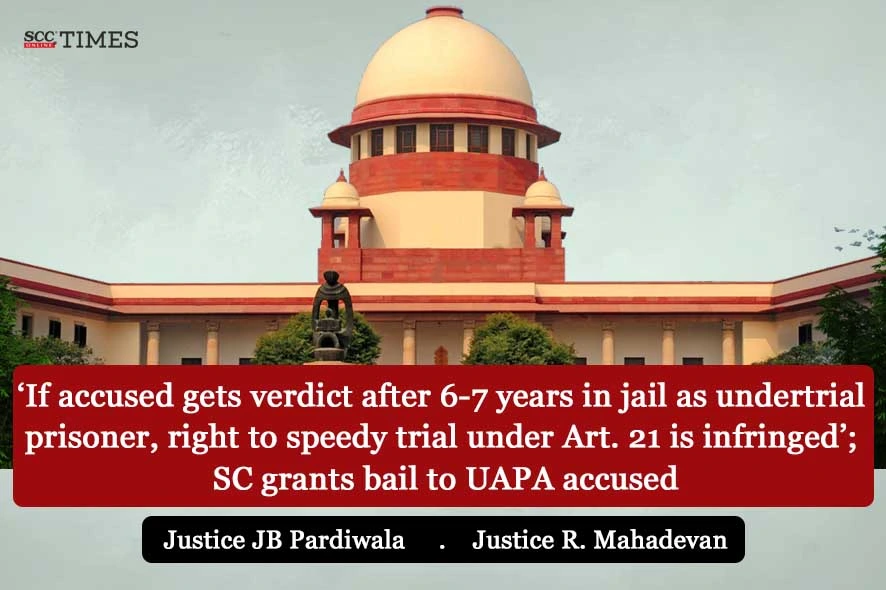Supreme Court: In a criminal appeal against Chhattisgarh High Court’s decision, whereby, the High Court dismissed the appeal filed by the appellant-accused and declined to release him on bail for the offence punishable under Sections 10, 13, 17, 38(1)(2), 40, 22-A and 22-C of the Unlawful Activities Prevention Act, 1967 (‘UAPA’), Sections 8(2), (3) and (5) of the Chhattisgarh Vishesh Jan Suraksha Adhiniyam, 2005 and Sections 120-B, 201 and 149 read with Section 34 of the Penal Code, 1860 (‘IPC’), the Division Bench of JB Pardiwala and R. Mahadevan, JJ. allowed the appeal and set aside the impugned decisions considering the period of 5 years the accused had spent as an undertrial prisoner and directed to release him on bail forthwith subject to terms and conditions as may be imposed by the Trial Court.
The Court directed that the accused shall not enter into the revenue limits of district Kanker, Chhattisgarh. He shall appear online on each date of the hearing before the trial. It is only in the last when his further statement under Section 313 of the CrPC is to be recorded, he shall personally remain present before the Trial Court.
Background
It was alleged that on 24-03-2020, the accused was travelling in his vehicle carrying articles ordinarily used in the Naxalite activities. The police intercepted the said vehicle with articles such as 95 pairs of shoes, green black printed cloth, two bundles of electric wire each of 100-meter, LED lens, and walki talki.
Analysis and Decision
At the outset, the Court reiterated that once the trial commences and the witnesses are being examined then in serious crimes like murder, dacoity, rape, etc, the Court ordinarily should not exercise its discretion for the purpose of grant of bail.
However, in the matter at hand, the Court noted that the accused was in custody as an under-trial prisoner since 24-03-2020 and that he had no other antecedents. The panch witnesses to the recovery panchnama had also turned hostile. Hence, considering that it had been five years that he was in judicial custody and the counsel for the State had no idea regarding the time likely to be consumed to complete the recording of the oral evidence, the Court directed to release the accused on bail.
Without undermining the seriousness of the alleged crime, the Court reiterated that howsoever serious a crime may be, the accused has a fundamental right to speedy trial as enshrined in Article 21 of the Constitution.
The Court also noted that the prosecution proposed to examine 100 witnesses, the Court said that it is the public prosecutor who could be said to be in-charge of the trial and he has to decide who is to be examined and who is to be dropped, but no useful purpose would be served if 10 witnesses are examined to establish one particular fact. The Court pointed out that it results in indefinite delay in conclusion of trial. The Court observed that it is expected of the Public Prosecutor to wisely exercise his discretion in so far as the examination of the witnesses is concerned.
Relying upon Malak Khan v. Emperor [AIR 1946 Privy Council 16], the Court reiterated that where the number of witnesses is large, everyone witness does not need to be produced.
In this aspect, the Court also highlighted the importance of the role of the Special Judge (NIA) who should inquire with the Special Public Prosecutor why he intends to examine a particular witness if such a witness is going to depose the very same thing that any other witness might have deposed earlier.
Examining the issue of delay and delay from a true perspective, the Court stated that if an accused is to get a final verdict after the incarceration of six to seven years in jail as an undertrial prisoner, then, definitely, it could be said that his right to have a speedy trial under Article 21 of the Constitution has been infringed. The Court also addressed the stress of long trials on accused persons — who remain innocent until proven guilty.
The Court observed that accused persons are not financially compensated for what might be a lengthy period of pre-trial incarceration. They may also have lost a job or accommodation, experienced damage to personal relationships while incarcerated, and spent a considerable amount of money on legal fees. If an accused person is found not guilty, they have likely endured many months of being stigmatized and perhaps even ostracized in their community and will have to rebuild their lives with their own resources.
CASE DETAILS
|
Citation: Appellants : Respondents : |
Advocates who appeared in this case For Petitioner(s): For Respondent(s): |
CORAM :










